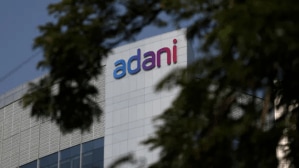Money changers cash in on Lahore-Delhi bus
Just five days since the Delhi-Lahore bus service started and Pakistan’s informal money changers at Wagah are celebrating. Brisk moveme...

Just five days since the Delhi-Lahore bus service started and Pakistan’s informal money changers at Wagah are celebrating. Brisk movement of passengers has meant the Indian rupee is cheaper vis-a-vis the Pakistani one.
On July 11—the day the first bus rolled in after 18 months—100 Pakistani rupees fetched Rs 80 in Indian currency. Today it was down to Rs 77. ‘‘The bus has restarted now, the value will fall further,’’ says Akram, a money-changer at Wagah. This is in contrast to the actual market rate where 100 Pakistani rupees fetch Rs 79.8 (Indian).
He recounts the value of the Indian rupee had fallen to Rs 72 at one point when the bus service was on. ‘‘The rates have to go down further. Our rates depend on the quantity of money we exchange daily. After the bus stopped, there were barely five to 10 persons crossing the border in a week. The rates had gone up to around Rs 90 for every 100 Pakistani rupees. But with the bus service resuming, more people cross the border which means more money and lower rates.’’
Since such informal exchange practice does not go on in India, the impact is more visible on the Pakistani side. “Hamari to local economy hai. Koi aisa fixed rate to hai nahin jaise aapke yahan par hai, to rate daily basis par change hotey rehte hain (Ours is a local economy. We have no such fixed rate like yours, so the rate keeps changing on a daily basis depending on the volume).
Money changers are not alone in their celebration. Joining them are porters clad in green kurtas who skip all rules to ensure than every passenger doles out Rs. 20-25 (Pakistani). Unlike the Indian porter who is more discreet with his demands, the Pakistani porter sees it as a routine practice even if the passenger might have lifted his own baggage. ‘‘This is all we get over and above our salaries. We have been waiting for the bus to begin,’’ says Rehman, a porter.
But the journey back from Lahore saw a sharp escalation in the amounts demanded by porters. Yet, this didn’t dampen the spirits of passengers— most of whom attach some sentiment to the journey.
For Ramzan Ali Mullah, who travelled to Delhi today, it was a long-awaited homecoming. A resident of West Bengal, Ramzan travelled to Lahore in November 2001 to visit his uncle for a month. Just as his date of return neared, the bus service was suspended. ‘‘We are not wealthy enough to afford the air fare which meant I had to stay in Pakistan. My visa was extended for a month given the peculiarity of my case.’’
His woes did not end there. Ramzan coughed blood one morning and it was diagnosed as tuberculosis. ‘‘This turned out to be a blessing in disguise because I got more extensions on my visa. For nearly two years, I have been stuck in Pakistan.’’ Ramzan is eager to meet his five children who live in Hooghly district. ‘‘I just want to get home. Enough of this travel.’’
Another passenger Shirina Nasir, an Indian who has taken Pakistani citizenship after marriage, was visiting her parents after two-and-a-half years. She says: ‘‘I am never going to advise any Indian woman to get married in Pakistan or vice-versa.’’
Though passengers reel out complaints, they are still lining up at the Indian High Commission in large numbers.






- 01
- 02
- 03
- 04
- 05

























